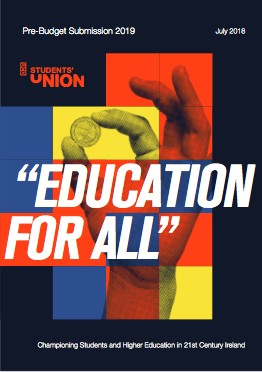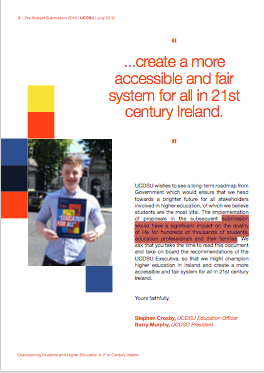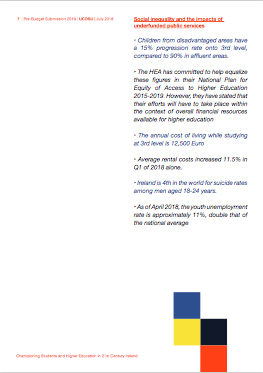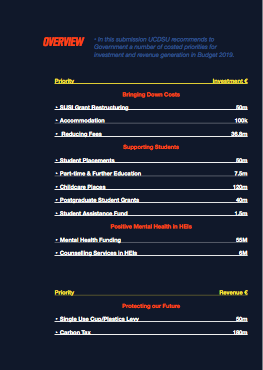University College Dublin Students’ Union (UCDSU) plagiarised the Union of Students in Ireland’s (USI) pre-budget submission, lifting long passages word for word for its own document, The University Times has learned.
The unions submitted their proposals in recent weeks to the government to be considered for Budget 2019, calling for increased funding for higher education, mental health services and accommodation.
Vast chunks of text from UCDSU’s document are identical to USI’s counterpart, which was published beforehand. Most of the passages elaborating on policy proposals are taken word for word from USI, while others include some minor changes, such as word substitution or different paragraph breaks.
The structure of the two documents is extremely similar, with USI’s going through the “proposal”, “responsibility” and “rationale” of each policy and UCDSU’s organised into the “what”, “who” and “why” of each policy.
The majority of the 30-page document is plagiarised






























The only completely original part of the document is a proposal for an increase in childcare places to improve access to higher education for student parents.
USI submits its pre-budget document every year on behalf of its 31 member organisations. UCDSU, which is not a member of USI, has in recent years produced pre-budget submissions on behalf of UCD students.
In an email statement to The University Times, UCDSU Education Officer Stephen Crosby said that the document “was created internally utilizing a number of resources as noted in the acknowledgements and references section of the piece”. He did not address the plagiarism directly.
Crosby spoke on behalf of UCDSU President Barry Murphy, who is currently on annual leave. Crosby said that “similar work has been completed by IBEC, USI, Mental Health Reform, the IUA and others acknowledging the deficit in resources allocated to Irish Higher Education Institutions and related services”.
“UCDSU welcomes that similar conclusions have been found by other organizations and hopes that Government will carefully consider the requests of those directly involved in student support and economic development”, he said.
Most of the plagiarism is word for word
For example, the sections on accommodation are almost identical:
Affordable, quality housing is not a luxury; it is a necessity to creating a successful learning environment.
Proposal: For the government to provide a capital grant specifically for HEI’s development of student accommodation.
Responsibility: Department of Education and Skills
Rationale: The Government’s National Student Accommodation Strategy outlined that, as of July 2017, there was an excess demand of purpose built student accommodation of 23,634 beds. This is expected to increase to 25,754 beds in July 2019 before we see a reduction to 20,986 in 2024.
With substantial rent increases in the private rented sector and a projected increase in student numbers in the years ahead, an increased provision of designated student accommodation has the potential to ease ongoing demand pressures in the private rented sector. The provision of additional student accommodation ensures additional benefits to the wider economy and society through the economic activity that it generates and through the development of localities in less commercially attractive areas.
In terms of economic activity, it is estimated that 200 jobs are created during the construction phase of a €150m project with resultant VAT, PAYE and PRSI receipts. In addition, a considerable number of additional permanent campus jobs would be created in maintenance and management of any new development and, of course, in the provision of education itself.
Data collected by the HEA shows that while there are substantial capital costs, on-campus accommodation can also provide a sustainable income stream for the HEI over the longer term which should be considered positively in the context of the current work of the Higher Education Funding Group.
International research has shown that students living in on-campus accommodation have higher rates of retention than commuter students (Pascarella and Terenzini 2005; Thomas 2012 as quoted by Gormley 2015 P.1), and also exhibit higher scores on developmental scales (Chickering and Reisser, 1993 as quoted by Gormley 2015 P.1).
In addition, Enterprise Ireland estimated that a direct economic impact of around €345m resulted from expenditure by international students in higher education in 2012, with a further €120m from related friends and family tourism. The availability of campus accommodation is a prerequisite for attracting new overseas students, with the projected increases in international student numbers putting further pressure on availability of student accommodation.
There is also currently a significant demand for bed spaces for students with disabilities. This demand is not being met by the available supply, and is not meeting the needs of a diverse group with both physical and invisible disabilities. On campus accommodation is generally regarded as the preferred option to enhance student participation and this is significantly more so the case for students with disabilities.
▸ What? For the government to provide a capital grant specifically for HEI’s development of student accommodation.
▸ Who? Department of Education and Skills
▸ Why? The Government’s National Student Accommodation Strategy (2017) outlined that, as of July 2017, there was an excess demand of purpose built student accommodation of 23,634 beds. This is, according to the department, expected to increase to 25,754 beds in July 2019 before we see a reduction to 20,986 in 2024. Substantial rent increases in the private rented sector and a projected increase in student numbers in the years ahead highlight the major importance of committing to purpose built student accommodation. An increased provision of designated student accommodation along the parameters outlined in this submission has the potential to ease ongoing demand pressures in the private rented sector. This would in turn free up supply for other members of Irish society.
The provision of additional student accommodation ensures additional benefits to the wider economy and society through the economic activity that it provides. In terms of economic activity, it is estimated that 200 jobs are created during the construction phase of a €150m project with resultant VAT, PAYE and PRSI receipts. In addition, a considerable number of additional permanent campus jobs across Ireland would be created in maintenance and management of any new development and, of course, in the provision of education itself.
Data collected by the HEA shows that while there are substantial capital costs, on-campus accommodation can also provide a sustainable income stream for the HEI over the longer term which should be considered positively in the context of the current work of the Higher Education Funding Group.
The availability of campus accommodation is an absolute necessity for attracting new overseas students, with the projected increases in international student numbers putting further pressure on availability of student accommodation. Enterprise Ireland has estimated that a direct economic impact of around €345m resulted from expenditure by international students in higher education in 2012, with a further €120m from related friends and family tourism.
There is also currently a significant demand for bed spaces for students with disabilities. This demand is not being met by the available supply, and is not meeting the needs of a diverse group with both physical and invisible disabilities. On campus accommodation is generally regarded as the preferred option to enhance student participation and this is significantly more so the case for students with disabilities.
In the acknowledgements at the end of UCDSU’s submission, the union credits USI’s student dropout survey and student teacher placement report. The submission, however, does not reference USI’s pre-budget submission.
Speaking to The University Times, the President of USI, Síona Cahill, said: “It’s great to see a union like UCDSU come on board and support, effectively, the USI submission to government.”
Cahill said that “UCDSU clearly see the value and the need for the research USI has been driving forward on and the need for a national movement on the issues covered in the pre-budget submission”.
“To my mind it’s clear grounds for us to work together into the future”, she said.
Every year, USI organises a lobby day to discuss proposals set out in the pre-budget submission. This year, 130 TDs and senators attended – the highest in recent years, according to Cahill – and spoke to student representatives on the issues affecting students, including accommodation, fees and mental health.
The policies laid out in USI’s pre-budget submission come directly from motions discussed and passed at the organisation’s national congress, Cahill said. Proposals like the “latte levy”, which would see a 20c levy per disposable coffee cup, and the carbon tax came from this year’s national congress.
UCDSU voted to disaffiliate from USI in 2013, with 64.5 per cent of voters opting to leave the national union. In 2016, a referendum on re-affiliation failed after a strong grassroots campaign emerged accusing USI of being an “undemocratic and ineffective organisation” and condemning the “rushed” nature of the referendum. Since then, USI has kept communication lines open, inviting UCDSU to attend a training event last year. UCDSU, along with fellow nonmember union University of Limerick Students’ Union declined the invitation.
UCDSU’s referendum to disaffiliate came a year after UCDSU faced financial difficulties due to poor accounting practices. Campaigners arguing for disaffiliation at the time emphasised the need for UCDSU to stay focused on local issues as opposed to national ones, though the debate also featured criticism of USI’s structures and democratic procedures.
Cahill said that while “UCDSU has to call for a referendum itself” on any potential re-affiliation, that the union would be welcomed back into the national union: “It’s a long-term ambition of this organisation to have a full membership inclusive of UCDSU and certainly we’d be open to having a conversation with Barry and his team about this moving forward.”
This is not the first controversy over a document published by UCDSU. Last year, the union came under fire for reprinting its freshers’ guide, Winging It, to omit information about access to abortion. Then-President Katie Ascough was eventually impeached for the decision, which cost the union €8,000.
Graphics by Edmund Heaphy.






